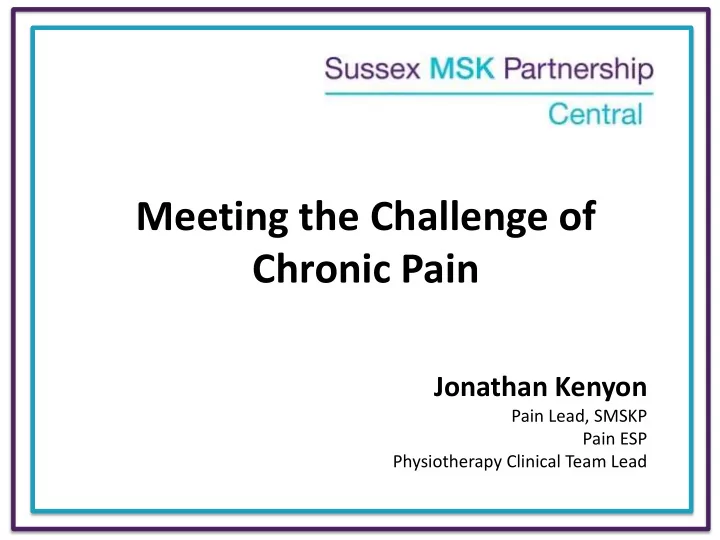

Meeting the Challenge of Chronic Pain Jonathan Kenyon Pain Lead, SMSKP Pain ESP Physiotherapy Clinical Team Lead
What do we need to do? Prevent chronicity developing - Identify those at risk as early as possible - Stop the cycle of multiple interventions and investigations – if possible - Address patients beliefs and behaviours at the earliest opportunity
Pain is not a single entity “Unpleasant sensory and emotional experience” It’s associated with fear, anxiety, depression, catastrophising, avoidance, negative thoughts etc. . . Successful treatments address both experiences
EARLY IDENTIFICATION STaRT Back: Identifies people at risk of developing chronicity Allows us to target treatment and prevent the development of secondary problems LOW RISK – Back Education Group MEDIUM RISK – Physiotherapy HIGH RISK – 1:1 Physio, FRP, PMP, 1:1 Psychology or referral to a pain practitioner (physiotherapist with a special interest in managing chronic pain)
EARLY IMPLEMENTATION NON SPECIFIC LOW BACK PAIN • Initially managed within primary care • If no improvement within two weeks – refer to Physiotherapy • ? Attach STarT Back to referral OTHER PAINS Refer to physiotherapy if you feel that patient’s: • Beliefs and behaviours are affecting their pain • That they would benefit from advice and information to decrease anxiety and fear about their condition • Need to be maintain activity
Keele STarT Back Screening Tool 1. Has your back pain spread down your leg(s) at some time in the last 2 weeks 2. Have you had pain in the shoulder or neck at some time in the last 2 weeks 3. Have you only walked short distances because of your back pain 4. In the last 2 weeks, have you dressed more slowly than usual because of back pain 5. Do you think it’s not really safe for a person with a condition like yours to be physically active 6. Have worrying thoughts been going through your mind a lot of the time 7. Do you feel that your back pain is terrible and it’s never going to get any better 8. In general have you stopped enjoying all the things you usually enjoy ? 9. Overall, how bothersome has your back pain been in the last 2 weeks? Not at all Slightly Moderately Very much Extremely 0 0 0 1 1 3 or less = Low Risk 4 or more (Sub score Questions 5-9) Sub score 3 or less = Medium Risk Sub score 4 or more = High Risk
Red Flags Identified Pain pathway redesign Refer to another MSK pathway REFERRAL Return to Practice TRIAGE Refer to Substance Misuse MDT Clinical Psychology Complex/Known Assessment patient – refer to MDT* PAIN ASSESSMENT APPOINTMENT Pain ESP Pain Practitioner Nurse Specialist * MDT Review GPwSI Consultant Management Options – See Pain Pathway
Management Options Invasive Individual Information procedures Psychology sessions Back to Work Substance Physiotherapy Schemes Misuse Service Medication Mindfulness Counselling review Groups Pain Functional . . . Onward referral: Management Restoration Psychiatry Programme Programme
EARLY IDENTIFICATION EARLY IMPLEMENTATION TARGETED TREATMENT - SENSORY - EMOTIONAL “SUPPORTED SELF MANAGEMENT SHOULD NOT BE A TREATMENT OF LAST RESORT . . . “
Recommend
More recommend